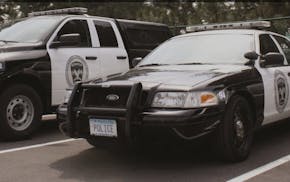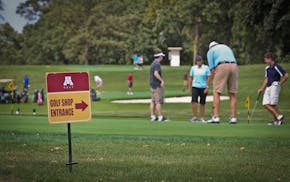WASHINGTON, D.C. — A federal prosecutor stood before a freshly selected jury Thursday and zoomed in on video clips of the Minnesota father and son standing at the front of the line of rioters in the face of officers protecting the U.S. Capitol grounds.
The footage from the west side of the Capitol from the Jan. 6, 2021, insurrection purports to show Kenneth Wayne Fuller, 45, and Caleb Fuller, 22, both of Cleveland, Minn. They are charged with entering the Capitol grounds alongside other rioters with the goal of preventing Congress from certifying President Joe Biden's 2020 victory over incumbent Donald Trump.
The Fullers were in an area the prosecution made clear they were "not allowed and didn't belong," U.S. Attorney Cytheria Jernigan said during her opening statement.
Their joint trial began Wednesday after two days of jury selection and four years after the insurrection. Amanda Fuller, Kenneth's wife and Caleb's mother, looked on from the courtroom gallery.
The Fullers are charged with a felony count of obstruction of law enforcement during civil disorder and misdemeanor counts of knowingly entering a restricted building without lawful authority and disorderly conduct in a restricted building.
The trial began after U.S. District Judge Colleen Kollar-Kotelly rejected the Fullers' efforts to delay their trial until President-elect Trump's inauguration on Monday.
The government told the jury that the rioters had come to do harm that day. Jernigan said Kenneth Fuller allegedly told fellow rioters: "I don't want to hurt them either, but I want the traitors to die.'"
But the Fullers' defense painted a different picture of the father and son, and how events unfolded. The defense pointed out in its opening statements that by the time the Fullers arrived at the Capitol, rioters had already breached the grounds and that they left once they were told to go by officers.
The defense also sought to humanize them. Kenneth Fuller was described as a father who was also a minister and Caleb Fuller as a young man who had graduated from high school shortly before the 2020 presidential election and become consumed in conflicting reports about who won the election.
"Caleb Fuller is not guilty of any of this, and we're going to prove it to you," said attorney Peter Moyers, who represents the younger Fuller.
Moyers told jurors that his client plans to testify during the trial, which is expected to last up to two weeks.
The defense described the Fullers as being from a rural part of the country and who took the time to drive Washington and happened to take part in the insurrection after Trump urged his supporters during a rally that day to protest at the Capitol.
The defense showed photos of the father and son posing at monuments right after the rally — saying they went sightseeing immediately afterward instead — before heading to the Capitol without entirely knowing what was unfolding.
The first prosecution witness to testify was Capt. Rani Brooks, who was a lieutenant with the Capitol Police at the time of the riot.
Brooks recalled being pulled down and tackled by rioters who yanked off her helmet and gas mask asking her: "Do you want to die?"
Efforts to delay, move trial quashed
In seeking to delay their trial until after the inauguration, the Fullers argued it would be an unnecessary waste of resources to proceed given that Trump, while campaigning for president, "repeatedly stated he would pardon those 'patriots' who were involved in the Jan. 6 unrest."
They had also tried to move the trial from Washington to Minnesota out of concern that prospective jurors would be too familiar with the riot and not be impartial.
Both requests were denied.
Kollar-Kotelly decided to proceed as planned, stating that she rejected their invitation to speculate about future clemency decisions.
In turning down the change of venue request, the judge said such actions are rarely granted and there was already established precedent to impanel "fair and impartial" juries in Washington other Jan. 6 cases.
"Nonetheless, the court concludes that this matter is not the 'extreme case' in which insurmountable community prejudice may be presumed without direct evidence," Kollar-Kotelly wrote in an order.
Instead, the judge agreed with the defense's request to expand the list of questions for prospective jurors to weed out those who may be biased toward their case.
The 44 questions jurors were asked included: "Do you have strong opinions — either positive or negative — about President-elect Donald J. Trump, or about his supporters, that would affect your consideration of the evidence in this case or your ability to be a fair and impartial juror?"
Jurors were also asked: "Do you have strong opinions — either positive or negative — about the events that took place at the U.S. Capitol on January 6, 2021, or about people who were present at the Capitol on that date, that would affect your consideration of the evidence in this case or your ability to be a fair and impartial juror?"
The Fullers are among the 15 Minnesotans who have been charged with crimes related to Jan. 6. Seven of them await trial. And of the eight who have been tried and sentenced, most served little to no time imprisoned for what have largely been nonviolent offenses. Some sentences included home detention or probation.
Staff writer Paul Walsh contributed to this report.

Four arrested, no one injured in fighting and shooting following Burnsville High School graduation

One man dead in shooting Friday outside Northtown Mall in Blaine

University of Minnesota is putting its golf course up for sale
Supreme Court allows DOGE team to access Social Security systems with data on millions of Americans

